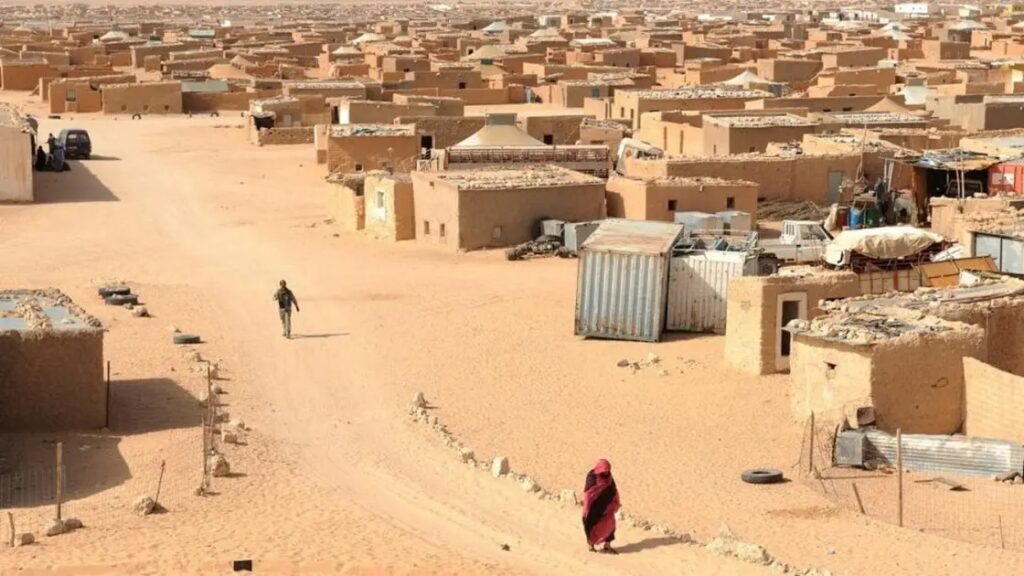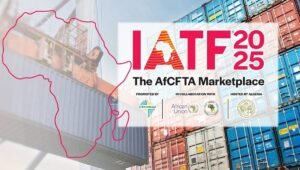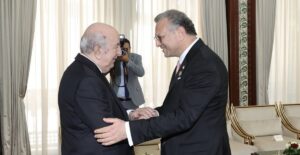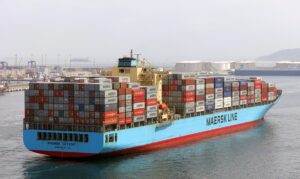The Algerian regime fires the coup de grace at the "Tindouf Republic" and replaces it with the "Rif Republic"!!

A new "disgrace" has been introduced by the Algerian generals' regime, following its failed hosting, attendance, and production of the "International Rif Day," in its second attempt to suggest its ability to annoy the Kingdom of Morocco by opening a "separatist front" against it, after the one concerning the Sahara. Both attempts were the subject of numerous Moroccan and Algerian writers, mainly on the media and social media, who joined in mocking the new attempt by the Algerian military regime to craft a narrative that could annoy Morocco. However, the already known result emerged: no one paid attention to the issue, whether in Morocco, the region, the continent, or internationally. In fact, it sparked the wrath of Algerian citizens, who saw the attempt as a new gateway to squandering billions of dollars in oil and gas, in failed endeavors that have no chance of success.
Because we consider the Algerian Rif Day a "non-event," we will simply ignore the event itself, to discuss its most significant significance and potential impact on the "Tindouf Republic" and the Polisario mercenaries in particular. To begin with, the Algerian regime's announcement of its support for the creation of a new Moroccan separatist movement, and its intention to support it "by all means," is a clear admission, without ambiguity or interpretation, that the first separatist movement (the Polisario) has exhausted its objectives and no longer harms Morocco. On the contrary, it has become a heavy burden and a real source of harm to the Algerian regime, and one of the most prominent reasons for fueling the Algerian people's anger toward its generals. Logically, if the issue of the separation of the Sahara from Morocco is still capable of disturbing Morocco and hindering the country's development, why would the Algerian regime need to start from scratch with a new separatist movement, with zero chances of success and emerging conditions far removed from those in which the Polisario Front emerged half a century ago?
This impromptu announcement of the "birth of a new Moroccan separatist movement" in the heart of the Algerian capital, and the unequivocal declaration by Algeria's powerful generals of their desire to support and finance this movement, sends the primary and sole message not to Morocco, but to the Polisario mercenaries, clearly stating: Your expiration date has expired long ago, you can no longer live, and we cannot "turn the wheel of history" or provide political or military support that would enable you to continue living for a longer period. While it is true that President Tebboune and the rest of the powerful generals continue to regurgitate the old refrain of "supporting the Sahrawi people's struggle for self-determination," the adoption of an alternative separatist movement in northern Morocco has caused an earthquake in the Tindouf camps, prompting a discussion of the alternatives available to the Polisario mercenaries, following the Algerian generals' decision to "retire" them en masse, regardless of their age!
The first question the powerful Polisario leadership must attempt to answer relates to the prospects for individual salvation. Spain, their traditional first choice, will not be suitable for everyone, especially war criminals and those who could be criminally prosecuted, given the improvement in Spanish-Moroccan relations. This question stems from another one, formulated in the form of a question: Is Morocco still "forgiving and merciful" towards them? In clearer terms: Is the option of returning to Morocco and receiving a royal pardon still valid, after the suffering they have inflicted on thousands of Sahrawi detainees in Tindouf? And if Morocco is not a feasible option for the majority, can Mauritania accept them? Or are the few remaining allies in Latin America, East Timor, and Laos their only viable option, a haven that can contain them while they await their inevitable end? Related to these questions is another question related to the best time to "jump off the sinking boat"! Are they waiting for orders from the Algerian generals to leave, or should they take the initiative now and seek what is hoped will be a safe haven before the chaos of the "great mass escape" of Polisario leaders and cadres, and the subsequent remaining detainees, the overwhelming majority of whom have no alternative to the Moroccan homeland.
Thus, what the generals did not reckon with was the impact their declaration of support for the "independence of the Rif Republic" would have on the morale of the "Tindouf Republic" mercenaries. Perhaps they intended this to prompt the Tindouf mercenaries to hasten their escape, in order to relieve themselves of the burden of securing safe havens for them around the world, or the need to host them inside Algeria, a nightmare option for the generals. What makes this possibility unlikely, however, is the lack of a strategic mind capable of thinking even inside the box, to consider such a scenario, as part of an attempt to address the negatives surrounding the generals' regime from all sides.
In conclusion, Morocco has a great opportunity to keep the door ajar for leaders not stained with Sahrawi blood, in order to hasten the collapse of the illusory republic in Tindouf and bring closer the hour of relief for the Moroccan Sahrawis detained in the camps of shame. This effort must be coordinated with the Mauritanians and the Spanish to fully achieve its intended benefits. Then we will see how the Algerian generals will manage their failed efforts to support the artificial Rif separatists in the face of the Algerian people, who will not accept that their regime waste billions more on a new illusion. Whatever the case, the Algerian military has created a new crisis with their own hands, which will not end until it topples them and hastens the salvation of the Algerian people.





